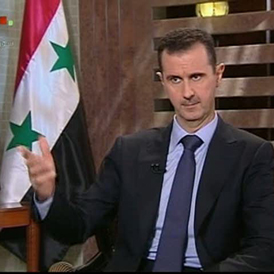Assad warns west against military action
The Syrian president says he is “not worried” about security in his country and warned against any foreign military action against his regime.

Assad faces growing Western calls to step down over his harsh crackdown on more than five months of pro-democracy protests in which the United Nations says around 2,000 civilians have died.
No country has proposed the kind of action against Syria which Nato forces have carried out in support of Libyan rebels seeking to topple Muammar Gaddafi. But the West has called on Assad to step down and Washington has imposed new sanctions.
In his fourth statement since the uprising began, Assad said: “As for the threat of a military action … any action against Syria will have greater consequences (on those who carry it out), greater than they can tolerate.
“As for the security situation (it) has become more militant in the recent weeks,” Assad said. “We are capable of dealing with it… I am not worried.”
The opposition has dismissed Assad’s promised political reforms and many opposition figures have rejected his call for a national dialogue, saying there can be no discussion while security forces continue to kill protesters.
Seeking to unify their fragmented movement, opposition figures have gathered in Turkey to nominate a broad-based council to support the uprising. Organisers expect to finish talks within days.
“The discussions are focusing on moving away from quotas toward a more merit-based council,” Professor Wael Merza, one of the delegates, said. “We expect to reach consensus on the list of names by the end of this week.”
